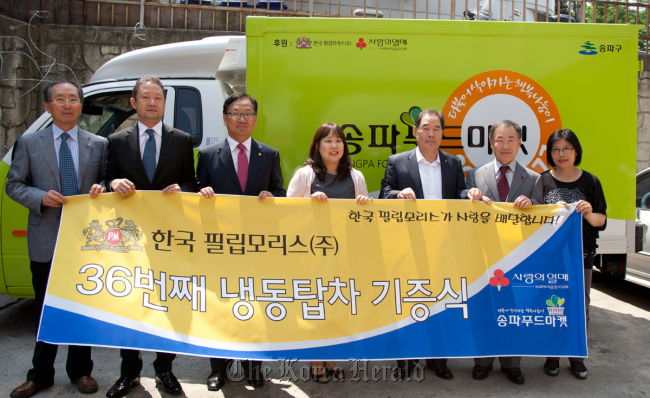A silent but potent war is brewing between tobacco makers and the government over whether the companies should be permitted to contribute to social causes.
In September, the Ministry of Health and Welfare signaled that it was time to end what they consider to be “promotion-oriented” contributions from cigarette companies by announcing a new legal revision.
Under the new rule, companies, which had been permitted to sponsor sports-related campaigns for raising social awareness on significant issues without exposing their corporate identities, would be restricted from campaigns in all sectors. This includes art, culture and others, except if the campaign or benefit is related to helping quit smoking or is on research for cigarette ingredients.
They can still sponsor via affiliates or foundations, but except for the largest KT&G, none of the tobacco makers have sister firms or foundations they can turn to.
Government officials say the revision was designed to prevent the promotion of cigarettes, and also to follow the recommendations issued by the World Health Organization in 2005.
The WHO calls for member countries of the Framework Convention for Tobacco Control -- which includes Korea -- to stop social contributions from cigarette makers within five years since the recommendation was issued.
Surprisingly enough, countries known to be hotbeds for heavy smokers, such as the U.K. and France have all complied.
Korea is among the few nations of developing or developed status to not have adopted the recommendation.
Tobacco companies are seething, but are forced to bite their tongue because of the social atmosphere condemning smokers and cigarettes, and the red tape they are bound with that seems to get heavier each year.
“This is stifling our social contribution, and what’s more is, it’s anti-social because it means there will be less funds for these campaigns and events that people and society need,” said one official of a tobacco company who spoke to The Korea Herald on the condition of anonymity.
In 2011, the nation’s four largest cigarette companies--KT&G, Philip Morris, British American Tobacco and Japan Tobacco International--contributed some 3.6 billion won for social causes.
Good timing?
What’s more, the firms are now accusing the government of timing the revision with the upcoming WHO convention -- the Framework Convention for Tobacco Control -- which Seoul will be hosting this year.
The biannual event is one of the biggest events in the industry.
Tobacco companies, however, are denied access to any of the organizers for fear of hurting their neutrality.
“What this means is that we literally have no channel, no conduit whatsoever, to relay our views on what the revision means to us and for society,” said the official.
Ironically, the months leading up to the convention, which is scheduled from Nov. 12-17, is when the government receives comments on the revision to make possible adjustments.
The Health Ministry refutes the claims, citing that Korea is a latecomer in complying with the recommendation.
“As we all know, it’s been more than five years since we signed the pact to stop the promotion of cigarettes, so we’re actually behind schedule,” said Bae Geum-joo of the ministry’s department on promoting public health.
She said the revision had been indeed timed to coincide with the convention.
Bae added that the ministry was hoping for the revision to get passed at the Nov. 6 cabinet meeting in order to go in to effect in February.
Tobacco makers are currently conducting sponsorships under the names of their affiliates or individual foundations they have set up for charity purposes.
KT&G, the country’s largest shareholder in the industry, for instance, sponsors events such as Formula 1 under its affiliate.
Internal friction
The Ministry of Strategy and Finance, meanwhile, has views that appear to clash with the Health Ministry.
In July, the Finance Ministry had already agreed on a revision that allows tobacco makers to directly or indirectly sponsor non-profit events aimed at promoting public health or environmental protection.
The current law states that the finance minister has the authority to order cigarette companies to engage in such activities.
Law authorities say that it doesn’t appear likely that both revisions will be passed, as they hold clashing views.
The Health Ministry, however, said there was no problem, saying that the content of the two revisions were the same.
Some in the industry found this difficult to understand.
“One revision allows firms to directly engage in social contribution. The other bans it. How are the two the same?” asked one industry source who also declined to be named.
Meanwhile, noting the high level of concern that the Health Ministry is being met with from tobacco makers, the ministry said there would be no problem because if the companies are serious about making contributions, they are still welcome to do so.
“It doesn’t have to be about revealing their names, does it? Companies can go on donating to their favorite charity organization or keep on making contributions to art or cultural events without having to plaster their name all over the event,” said Bae.
She suggested alternatives for letting the public and consumers know about these efforts, such as public disclosures or posting the information on the company websites.
Bae could not say how many people would go to the websites to find out, but said if promotion was the company’s main objective, they have no reason to object not being allowed to put their name on social campaigns.
By Kim Ji-hyun (
jemmie@heraldcorp.com)






![[Herald Interview] 'Trump will use tariffs as first line of defense for American manufacturing'](http://res.heraldm.com/phpwas/restmb_idxmake.php?idx=644&simg=/content/image/2024/11/26/20241126050017_0.jpg)
![[Health and care] Getting cancer young: Why cancer isn’t just an older person’s battle](http://res.heraldm.com/phpwas/restmb_idxmake.php?idx=644&simg=/content/image/2024/11/26/20241126050043_0.jpg)
